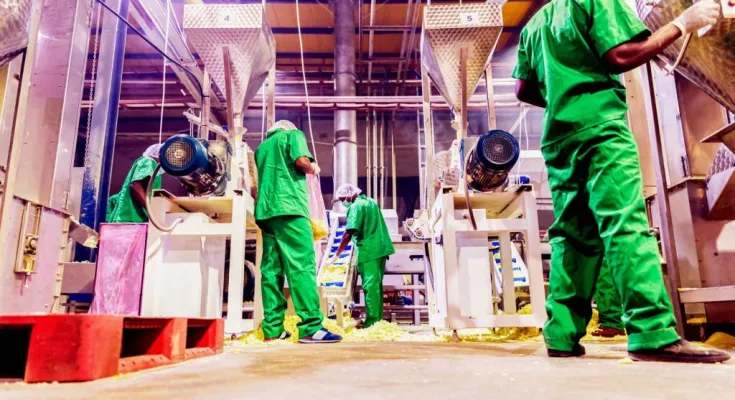Factory Helper needed in Canada 2024 – APPLY NOW
In the ever-evolving landscape of the Canadian industrial sector, the demand for skilled and unskilled labor continues to grow. One of the critical roles contributing to the efficiency of manufacturing processes is that of a factory helper. In this comprehensive exploration, we will delve into the requirements, responsibilities, and opportunities for factory helpers in Canada in 2024.
Advertisements
A factory helper plays a vital role in supporting various aspects of the manufacturing process. This entry-level position involves a range of tasks, from assisting skilled workers to maintaining a clean and organized work environment. In a fast-paced industrial setting, factory helpers are crucial for ensuring the smooth operation of machinery, handling materials, and contributing to overall productivity.
Factory Helper Job Responsibilities
- Assisting Skilled Workers: Factory helpers collaborate with skilled workers such as machinists, assemblers, and technicians. They provide valuable support by fetching tools, materials, and ensuring that the workflow is uninterrupted.
- Material Handling: Efficient material handling is a key responsibility. Factory helpers may be tasked with loading and unloading materials, transporting goods within the factory, and ensuring that materials are stored in designated areas.
- Machine Operation: While not typically involved in complex machinery operation, factory helpers may be trained to operate basic equipment. This can include simple tasks like starting and stopping machines, as well as monitoring processes.
- Cleaning and Maintenance: Maintaining a clean and organized work environment is crucial for safety and efficiency. Factory helpers are often responsible for cleaning work areas, machines, and tools. They may also assist in basic maintenance tasks.
- Quality Control: Some factory helpers may be involved in basic quality control measures, such as inspecting finished products for defects or irregularities. Reporting any issues to supervisors ensures that quality standards are upheld.
Requirements for the Role Factory Helper
- Educational Qualifications: While a high school diploma is generally the minimum requirement, specific educational qualifications may vary depending on the industry. Some positions may require additional vocational training or certification.
- Physical Fitness: The role of a factory helper often involves physical activities such as lifting, carrying, and standing for extended periods. Good physical fitness is essential to perform these tasks efficiently.
- Communication Skills: Effective communication is crucial for collaboration with other team members and understanding instructions. Factory helpers need to be able to communicate clearly and follow directions accurately.
- Basic Technical Skills: While not mandatory, having basic technical skills can be an asset. This includes familiarity with simple tools and machinery, as well as the ability to quickly learn and adapt to new equipment.
- Safety Awareness: Adherence to safety protocols is paramount in a factory setting. Factory helpers must be vigilant about following safety guidelines to prevent accidents and ensure a secure work environment.
Opportunities for Factory Helpers in Canada (2024)
Growing Manufacturing Sector: Canada’s manufacturing sector continues to expand, presenting numerous opportunities for factory helpers. Industries such as automotive, aerospace, and food processing are experiencing growth, creating a demand for skilled and unskilled labor.
Diverse Industries: Factory helpers may find employment in a variety of industries, from traditional manufacturing to emerging sectors like clean energy and technology. This diversity provides opportunities for individuals to explore different fields and gain valuable experience.
Career Advancement: While factory helper positions are entry-level, they can serve as a stepping stone for career advancement. With dedication and skill development, individuals may progress to supervisory roles or specialize in specific areas of the manufacturing process.
Advertisements
Training and Skill Development Programs: Many employers in Canada invest in training and skill development programs for their workforce. Factory helpers may have the opportunity to enhance their skills, acquire certifications, and broaden their knowledge, making them more versatile and valuable to employers.
Competitive Compensation: The demand for skilled and reliable factory helpers often leads to competitive compensation packages. Additionally, some employers may offer benefits such as health insurance, retirement plans, and bonuses to attract and retain skilled workers.
Job Stability: The stability of manufacturing jobs in Canada is another attractive aspect. As long as there is demand for goods production, there will be a need for factory helpers, providing a sense of job security for those in the industry.
Challenges and Considerations for Factory Helper jobs
- Automation Impact: The increasing integration of automation in the manufacturing sector may impact the demand for certain manual tasks traditionally performed by factory helpers. However, the need for human oversight, maintenance, and adaptation to new technologies can mitigate this challenge.
- Shift Work and Long Hours: Factory settings often involve shift work and long hours to meet production deadlines. Prospective factory helpers should be prepared for varying work schedules, including night shifts and weekends.
- Environmental Factors: Some manufacturing environments may expose workers to noise, dust, or other environmental factors. Employers are required to provide safety measures, but prospective employees should be aware of potential challenges associated with specific industries.
- Job Market Competition: While opportunities exist, the competition for factory helper positions may be intense in certain regions or industries. Individuals seeking employment should be proactive in acquiring relevant skills and certifications to stand out in the job market.
Conclusion
In conclusion, the role of a factory helper in Canada in 2024 offers a dynamic and rewarding entry point into the manufacturing sector. With a focus on collaboration, adaptability, and continuous learning, individuals can find ample opportunities for career growth and development. As the Canadian industrial landscape evolves, factory helpers remain essential contributors to the nation’s economic prosperity. Prospective workers are encouraged to explore the diverse opportunities available and prepare themselves to meet the demands of this integral role in the manufacturing sector.
Advertisements
Advertisements







